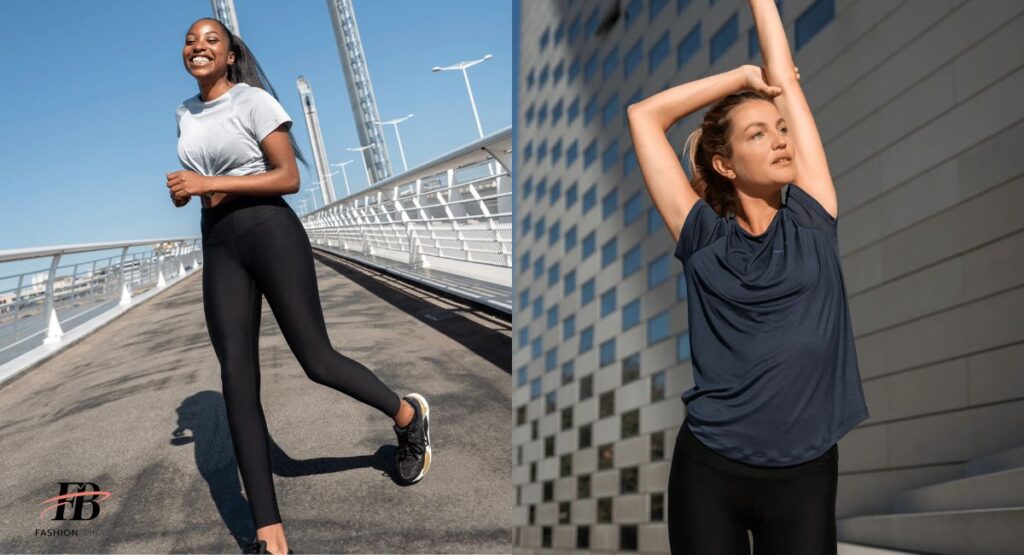Tencel and polyester are two popular fabrics with distinct characteristics. Tencel is made from eucalyptus trees and is known for its eco-friendliness. It feels soft breathes well and is great for sensitive skin. On the other hand polyester is synthetic and durable but it may not be as comfortable in hot weather.
When deciding between Tencel and polyester consider your priorities. If you prioritize sustainability comfort and skin-friendliness Tencel is the better choice. However if you value durability and affordability polyester might suit your needs better. Your decision should align with what matters most to you in a fabric.
Tencel vs. Polyester: The Ultimate Fabric Showdown
In the ultimate fabric showdown between Tencel and Polyester each has unique qualities to consider. Tencel is derived from eucalyptus trees boasting eco-friendliness and a soft breathable feel. It is a top pick for those with sensitive skin or a passion for sustainable fashion.
On the other side Polyester is a durable synthetic fabric known for its affordability and resistance to wrinkles. However it may not offer the same level of comfort as Tencel especially in warm weather. When making your choice think about your priorities in terms of sustainability comfort and longevity.
Key Takeaways
- Tencel is eco-friendly made from eucalyptus trees and gentle on both skin and the environment.
- Polyester derived from oil is durable but has a larger environmental footprint.
- Tencel offers softness breathability and moisture management ideal for hot weather or workouts.
- Polyester is less prone to wrinkles making it suitable for low-maintenance everyday wear.
- When choosing between Tencel and Polyester consider sustainability comfort and longevity.
Tencel vs. Polyester: An Overview

Tencel is a natural fabric made from eucalyptus tree pulp known for its eco-friendly production and softness. Polyester is a synthetic fabric derived from petroleum offering durability and wrinkle resistance. When comparing Tencel and Polyester consider factors like sustainability comfort and environmental impact.
What is Tencel?
Tencel also known as lyocell is a fabric made from the pulp of eucalyptus trees. It is environmentally friendly due to its closed-loop production process and biodegradability. Tencel is soft breathable and ideal for those with sensitive skin.
Tencel: eco-friendly fabric made from wood pulp
This is an eco-friendly fabric made from wood pulp specifically sourced from eucalyptus trees. Its production process involves using a closed-loop system that minimizes waste and environmental impact. This makes Tencel a sustainable choice for those conscious of their ecological footprint.
This fabric is renowned for its softness and breathability providing comfort to wearers in various climates. It also has excellent moisture-wicking properties making it suitable for activewear and hot weather. Additionally Tencel is hypoallergenic making it a gentle option for individuals with sensitive skin or allergies.
Many brands prioritize Tencel due to its environmental benefits and versatility. From clothing to home goods Tencel’s durability and eco-friendly nature make it a preferred fabric for those seeking sustainable alternatives.
What is Polyester?
Polyester is a synthetic fabric made from petroleum-based materials not natural fibers like cotton or wool. It is produced using machines and chemicals contributing to environmental concerns. Despite its drawbacks polyester is known for its affordability durability and versatility in various products.
This fabric is resistant to wrinkles making it low-maintenance and suitable for everyday wear. However polyester may feel less comfortable in hot or humid conditions due to its lower breathability. Considering factors like sustainability and comfort is crucial when choosing between polyester and other fabrics.
Polyester: synthetic fabric made from petroleum-based materials
It is a synthetic fabric created from petroleum-based materials unlike natural fibers such as cotton or wool. It manufactured using machines and chemicals in a process that raises environmental concerns.
Despite its environmental impact polyester is widely favored for its affordability durability and versatility. It may not be as comfortable as natural fabrics in hot or humid weather due to its lower breathability.
Read This Blog: Lil Jon Without His Glasses?
Tencel vs. Polyester: Environmental Impact

Tencel has a lower environmental impact due to its closed-loop production process. It minimal waste, and biodegradability making it a sustainable choice. In contrast Polyester has a larger environmental footprint because of its reliance on petroleum-based materials.
It energy-intensive production and non-biodegradable nature contributing to pollution and habitat destruction. When considering the environmental impact Tencel emerges as the more eco-friendly option. The aligning with sustainable fashion practices and minimizing harm to the planet.
Tencel: biodegradable, produced through closed-loop process
Tencel also known as lyocell is a fabric made from the pulp of eucalyptus trees. It developed as an eco-friendly alternative in the fashion industry. Its production process involves a closed-loop system that minimizes waste and environmental impact by reusing solvents and water. This makes Tencel a sustainable choice for those looking for eco-conscious clothing options.
Compared to traditional fabrics like cotton or polyester. Tencel offers softness breathability and moisture-wicking properties. It is gentle on the skin making it suitable for individuals with sensitive skin or allergies. Additionally Tencel’s biodegradability ensures that it can break down naturally. It reducing its impact on the environment compared to synthetic fabrics.
Polyester: contributes to pollution, habitat destruction, and climate change
Polyester despite its popularity contributes significantly to pollution through its production process and disposal. The extraction of petroleum-based materials for polyester manufacturing releases greenhouse gases worsening climate change. Additionally polyester’s non-biodegradable nature leads to long-term waste accumulation in landfills and oceans posing environmental hazards.
The production of polyester requires vast amounts of energy and water putting pressure on natural resources and ecosystems. This contributes to habitat destruction and negatively impacts biodiversity. It Considering these environmental consequences alternatives like eco-friendly fabrics become crucial for sustainable fashion choices.
Comfort and Breathability
Tencel is known for its exceptional comfort and breathability. It feels soft against the skin and allows air to flow keeping you cool and dry. This makes it an excellent choice for warm weather and activewear.
Polyester on the other hand is less breathable and can trap heat and moisture. While it is durable and resistant to wrinkles it may feel less comfortable in hot and humid conditions. Choosing the right fabric depends on your needs for comfort and breathability.
Different Uses of Tencel vs. Polyester
Activewear: Tencel is breathable and moisture-wicking, ideal for workouts while Polyester offers durability and strength suitable for sports gear.
Casual Clothing: Tencel provides softness and comfort for everyday wear whereas Polyester resists wrinkles and is easy to care for in casual outfits.
Home Textiles: Tencel’s cooling effect makes it suitable for bed sheets while Polyester’s durability is preferred in curtains and upholstery.
Formal Wear: Tencel’s elegant drape is favored in formal attire while Polyester’s structure and longevity are ideal for suits and dresses.
Medical Products: Tencel’s hypoallergenic properties make it suitable for bandages while Polyester’s toughness is valued in medical uniforms and covers.
Brands to Buy Tencel

Patagonia: Known for its commitment to sustainability Patagonia offers outdoor clothing and gear made with Tencel such as the Capilene Cool Trail T-Shirt. This blend of Tencel and recycled polyester provides comfort and moisture-wicking properties ideal for outdoor activities.
EILEEN FISHER: A brand focused on ethical and sustainable fashion EILEEN FISHER incorporates Tencel into many of its designs. The Tencel Jersey Scoop Neck Long Dress is a versatile and stylish option showcasing the softness and eco-friendly nature of Tencel.
Reformation: Renowned for its sustainable women’s clothing, Reformation uses Tencel in various garments including the popular Winslow Dress. Tencel’s sustainability and comfort make it a fitting choice for Reformation’s eco-conscious collections.
Amour Vert: With a strong emphasis on ethical practices Amour Vert offers Tencel-based clothing like the Julianne Tie-Front Dress. Tencel’s gentle feel and environmental benefits align with Amour Vert’s commitment to sustainability.
Allbirds: While primarily known for eco-friendly shoes Allbirds also offers clothing made from sustainable materials like Tencel in their Trino fabric line. The use of Tencel in their apparel reflects Allbirds’ dedication to environmentally friendly products across their range.
Also Read This Blog: Wallo Net Worth – Age, Girlfriend, Prison & Birthday
Pros and Cons of Tencel vs. Polyester
Tencel is eco-friendly soft and breathable but it can be more expensive and less durable than polyester. Polyester is affordable durable and wrinkle-resistant but it is less breathable and harmful to the environment. Choosing between them depends on your priorities like comfort cost and sustainability.
Pros of Tencel
- Eco-friendly: Made from sustainable wood pulp and biodegradable.
- Soft and Comfortable: Feels smooth on the skin and is breathable.
- Moisture-Wicking: Absorbs and releases moisture keeping you dry.
- Hypoallergenic: Gentle on sensitive skin and resists bacteria growth.
- Versatile: Used in clothing, bed sheets and medical products.
Cons of Tencel
- Expensive: Generally costs more than other fabrics.
- Less Durable: May not last as long as synthetic fabrics in heavy use.
- Special Care: Requires gentle washing and care to maintain quality.
Pros of Polyester
- Affordable: Generally cheaper than many other fabrics.
- Durable: Strong and long-lasting, resistant to wear and tear.
- Wrinkle-Resistant: Stays smooth and requires less ironing.
- Low-Maintenance: Easy to wash and quick-drying.
- Versatile: Used in many products from clothing to home textiles.
Cons of Polyester
- Less Breathable: Can feel hot and uncomfortable in warm weather.
- Environmental Impact: Production is harmful to the environment and not biodegradable.
- Retains Odors: Can hold onto smells more than natural fabrics.
Frequently Asked Question
What is the main difference between Tencel and polyester?
Tencel is made from natural wood pulp and is eco-friendly. Polyester is a synthetic fabric made from petroleum and is less environmentally friendly.
How are Tencel fibers made?
Tencel fibers are made from wood pulp, mainly from eucalyptus trees. The pulp is dissolved and spun into fibers using a closed-loop process.
Is Tencel or Polyester better for hot sleepers?
Tencel is better for hot sleepers because it is breathable and moisture-wicking. Polyester can trap heat and feel less comfortable.
Are Tencel fabrics sustainable?
Yes, Tencel fabrics are sustainable because they are made from renewable wood pulp. They are also biodegradable and produced using an eco-friendly process.
Can I wash my new Tencel sheets in the washing machine?
Yes, you can wash your new Tencel sheets in the washing machine. Use cold water and a gentle cycle to maintain their quality.
Conclusion
Tencel and Polyester each have their own set of advantages and drawbacks. Tencel stands out for its eco-friendly production process softness and breathability making it a great choice for those prioritizing sustainability and comfort. On the other hand Polyester offers affordability durability and low maintenance appealing to individuals looking for long-lasting and budget-friendly options.
The best fabric for you depends on your specific needs values and priorities. It Consider factors such as environmental impact comfort durability and cost-effectiveness when making your decision. Whether you opt for Tencel or Polyester making an informed choice aligned with your preferences. They will ensure that you get the most out of your clothing and contribute to a more sustainable future.











